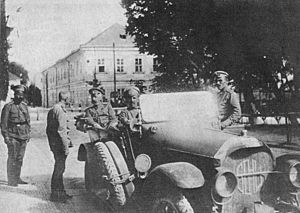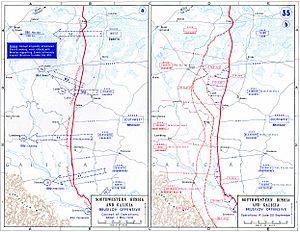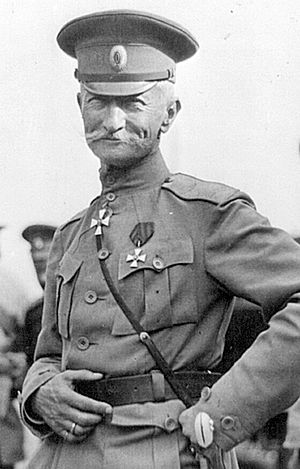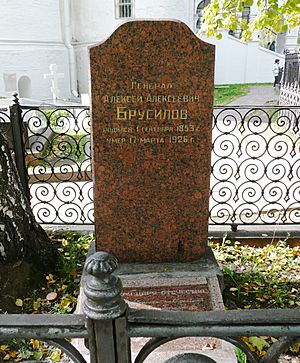Aleksei Brusilov facts for kids
Quick facts for kids
Aleksei Alekseyevich Brusilov
|
|
|---|---|
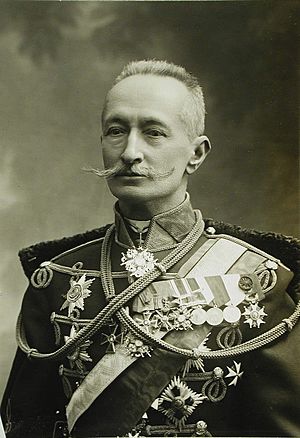
Brusilov in 1913
|
|
| Nickname(s) | 'The Iron General' |
| Born | 31 August 1853 Tiflis, Caucasus Viceroyalty, Russian Empire (now Tbilisi, Georgia) |
| Died | 17 March 1926 (aged 72) Moscow, Russian SFSR, Soviet Union |
| Allegiance | |
| Service/ |
|
| Years of service | 1872–1924 |
| Rank | |
| Battles/wars | Russo-Turkish War World War I Russian Civil War Polish-Soviet War |
| Awards | see below |
| Signature | |
Aleksei Alekseyevich Brusilov (born August 31, 1853 – died March 17, 1926) was a famous Russian general. He is best known for creating new attack plans during World War I. His most important success was the Brusilov offensive in 1916.
His new tactics were very effective and were even copied by the German army later on. Brusilov came from a noble family and his father was also a general. He started his career as a cavalry officer. However, by 1914, he realized that cavalry was no longer useful in modern warfare. This was because machine guns and artillery made cavalry attacks too dangerous.
Many historians believe he was the only Russian general in World War I who could win big battles. Even though he caused many enemy casualties, his own army also suffered heavy losses. The Russian army struggled to replace these soldiers.
Later, during the Russian Civil War, he supported the Bolsheviks. He helped to organize the early Red Army.
Contents
Early Life and Military Beginnings
Aleksei Brusilov was born in Tiflis, which is now in Georgia. His father was Russian, and his mother was Polish. For three generations, his family had served as officers in the Imperial Russian Army. His grandfather even fought against Napoleon's invasion in 1812.
Brusilov's father died in 1856, and his mother passed away soon after. Relatives in Kutaisi raised the young orphan. He was taught at home until he was 14 years old. In 1867, he joined the Imperial Corps of Pages in Saint Petersburg. This was a special school for future officers.
In 1872, he finished his training. He became an ensign in the 15th (Tver) Dragoon Regiment. This regiment was stationed near his family in Kutaisi.
Fighting in the Russo-Turkish War
Brusilov joined the Tver Dragoons in August 1872. He quickly showed his skills and became the regiment's adjutant. He was promoted to lieutenant in 1874.
He fought bravely in the Russo-Turkish War (1877–1878). He was mentioned in official reports three times for his actions. His unit fought in the Caucasus region. They helped capture the fortress of Ardagan (now in Turkey). For this, Brusilov received the Order of Saint Stanislav.
Later in the war, he also received the Order of Saint Anne. He was promoted to the rank of Stabskapitän. He led successful attacks on Ottoman Army positions near Kars. His bravery earned him a higher class of the Order of Saint Stanislav.
Becoming a Cavalry Expert
In 1881, Brusilov started studying at the Cavalry Officer School in Saint Petersburg. Two years later, he became a riding instructor there. He spent the next thirteen years at the school in various roles. He was an adjutant, a senior teacher, and a commander.
In 1900, he became a Major General. In 1902, he took command of the school. Under his leadership, the school became famous for training cavalry officers. Brusilov wrote papers about how to use cavalry in battle. He also visited France, Austria-Hungary, and Germany to learn more about horse training.
In 1906, Brusilov was given command of the 2nd Guards Cavalry Division. However, he was not happy there. His wife had died, and the city of St. Petersburg was in chaos after the 1905 Russian Revolution. He wanted to leave the capital.
In 1908, he was put in charge of the 14th Army Corps in Warsaw. He made many improvements to combat training there. He also got married again to Nadejda Jelihovski. In 1912, he was promoted to General of Cavalry. He became the Deputy Commander-in-Chief of forces in the Warsaw Military District.
First World War
Early Battles (1914–1915)
In July 1914, as the Russian army grew, Brusilov became commander of the 8th Army. This army was part of the Southwest Front in Galicia. The 8th Army quickly defeated the Austro-Hungarian Third Army. They advanced almost 150 kilometers (93 miles) very fast.
However, other Russian armies faced defeats, like the big loss at Tannenberg. This forced the 8th Army to retreat with the rest of the Russian forces. Despite this, Brusilov was awarded the Order of Saint George for his victories. Many future White Army commanders served under Brusilov at this time.
In early 1915, Brusilov advanced again. He moved through the Carpathian Mountains and into Hungary. During this time, Tsar Nikolai II visited the 8th Army. Brusilov was promoted to General-Adjutant, a very high rank.
Once again, events on other fronts changed his plans. A major breakthrough by the Central Powers at Gorlice-Tarnów forced Brusilov to retreat. By September, the 8th Army had pulled back 180 kilometers (112 miles). However, Brusilov's victories showed that Austria-Hungary struggled to defend itself. This forced Germany to send troops from the Western Front to help them.
The Famous Brusilov Offensive
On March 29, 1916, Brusilov was given command of the Southwest Front. He gained more freedom to plan his attacks. Before this, Russian attacks usually focused on small parts of the front. They used a lot of artillery and soldiers to try and break through. But these narrow attacks were easy for German forces to counter.
Brusilov decided to spread his attack across the entire Southwest Front. He hoped to confuse the enemy over such a large area that they would break somewhere. He did not waste bombs on unimportant areas. Instead, he targeted enemy command posts, roads, and other key places. This was to disrupt German control across the whole front.
Brusilov's new methods were very successful for World War I. Over the next three months, the Southwest Front advanced more than 30 kilometers (19 miles). This was along a front over 400 kilometers (250 miles) long. They captured 400,000 Austro-Hungarian prisoners.
However, the planned supporting attack from the West Front (to Brusilov's north) did not happen. This allowed Germany to move 17 divisions from France and Belgium to stop the Russian advance. For his great victory, Brusilov received the Sword of Saint George with Diamonds. He was one of only eight Russian commanders to get this award during World War I.
1917 and the Revolution
When the February Revolution began in Russia, Brusilov supported the Tsar giving up his throne. He believed it was important to stabilize the country to continue the war. He thought the Tsar should step down for Grand Duke Mikhail and a council. He said, "It is necessary to hurry, the faster to extinguish the flames [of revolution], otherwise we face innumerable catastrophic consequences."
In May of that same year, Brusilov became the Commander in Chief of the Russian Army. During this time, Brusilov was open to the ideas of the revolution. But his main goal was to win the war first. He believed that the central government's authority must be respected until peace was achieved. He also thought the army needed strict discipline.
He even sent a telegram to the Minister of War, Alexander Kerensky. He wrote that "only the application of capital punishment will stop the decomposition of army and will save freedom and our homeland." This view was not popular. Also, the Kerensky Offensive failed in July 1917. Because of this, Brusilov was replaced as Commander in Chief by Lavr Kornilov. Brusilov then moved to Moscow. When fighting broke out in Moscow after the October Revolution, he was badly wounded in his foot.
Life in Soviet Russia
Some former soldiers joined the new Red Army. Brusilov agreed that big changes were needed. On May 30, 1920, during the Polish–Soviet War, Brusilov wrote an appeal in the newspaper Pravda. It was called "To All Former Officers, Wherever They Might Be." He encouraged them to forget past problems and join the Red Army.
Brusilov believed it was a patriotic duty for all Russian officers to work with the Bolshevik government. He felt they were defending Russia from foreign invaders. Later, he and other leaders signed an appeal to officers of Baron Wrangel's army. They asked them to join the Russian Soviet Federative Socialist Republic.
At first, Brusilov served on a special group to decide how big the Red Army should be. Later, he trained new cavalry recruits and became the Inspector of Cavalry. He retired in 1924. But he still worked on special tasks for the Revolutionary Military Council.
He died in Moscow at the age of seventy from heart failure. He received an honorable state funeral. He was buried in the Novodevichy Convent. Both representatives from the 'new Russia' (the Bolsheviks) and the 'old Russia' (clergy and upper class) attended.
Legacy
Brusilov's war memories were published in English in 1930 as A Soldier's Notebook, 1914–1918. After the October Revolution, he worked for the Bolsheviks and joined the Red Army. Because of his role in the Red Army, many historians who supported the Tsar did not praise him. For example, Anton Denikin, who fought in the 1916 offensive, later criticized Brusilov. He said Brusilov had a "curious psychological breakdown" and ordered a needless retreat.
Assessment
The famous British Field Marshal Bernard Montgomery believed Brusilov was one of the seven most outstanding commanders of World War I. The others included Erich von Falkenhayn, Erich Ludendorff, Mustafa Kemal, Herbert Plumer, John Monash, and Edmund Allenby.
Honours and awards
- Russian
- Order of St. Anna, 3rd Class, 1878; 2nd Class, 1883; 1st Class, 1909
- Order of Saint Stanislaus, 3rd Class with Swords and Bow, 1878; 2nd Class with Swords, 1878; 1st Class, 1903
- Order of St. Vladimir, 4th Class, December 6, 1895; 3rd Class, 1898; 2nd Class, 1913
- Order of St. George, 4th Class, August 23, 1914; 3rd Class, September 18, 1914
- Golden St. George weapons, October 27, 1915; with Diamonds, July 20, 1916
- Foreign
- Order of the Lion and the Sun, Knight, 1874 (Persian Empire)
- Order of the Golden Star of Bukhara, Knight 2nd Class, 1896 (Emirate of Bukhara)
- Legion d'Honneur, Grand Officer, 1897 (French Third Republic)
- Order of the Red Eagle, Knight 2nd Class, 1898 (Kingdom of Prussia)
- Order of Karađorđe's Star (Kingdom of Yugoslavia)
Images for kids
See also
 In Spanish: Alekséi Brusílov para niños
In Spanish: Alekséi Brusílov para niños
 | William Lucy |
 | Charles Hayes |
 | Cleveland Robinson |


